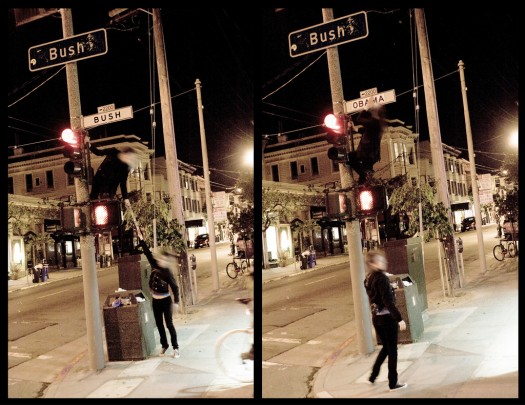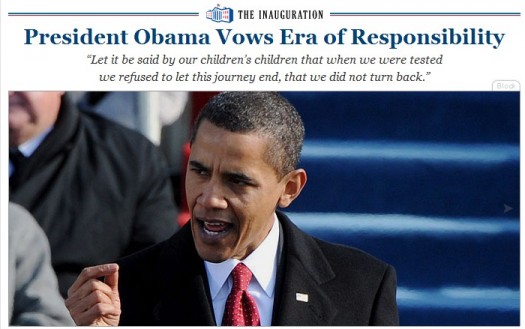Okay, one last political thing. In the wee hours before yesterday's inauguration, a genius prankster named Alex Zecca reportedly covered every "Bush" street sign from downtown to the Marina with a sticker that said "Obama." I heard about it when I got into work, but missed the chance to see it for myself. Luckily, Vanessa Naylon saw it happen. Awesome.
Tag: inauguration
President-elect Obama:
Our challenges may be new. The instruments with which we meet them may be new. But those values upon which our success depends — hard work and honesty, courage and fair play, tolerance and curiosity, loyalty and patriotism — these things are old. These things are true. They have been the quiet force of progress throughout our history. What is demanded then is a return to these truths. What is required of us now is a new era of responsibility — a recognition, on the part of every American, that we have duties to ourselves, our nation, and the world, duties that we do not grudgingly accept but rather seize gladly, firm in the knowledge that there is nothing so satisfying to the spirit, so defining of our character, than giving our all to a difficult task.This is the price and the promise of citizenship.…So let us mark this day with remembrance, of who we are and how far we have traveled. In the year of America's birth, in the coldest of months, a small band of patriots huddled by dying campfires on the shores of an icy river. The capital was abandoned. The enemy was advancing. The snow was stained with blood. At a moment when the outcome of our revolution was most in doubt, the father of our nation ordered these words be read to the people:"Let it be told to the future world…that in the depth of winter, when nothing but hope and virtue could survive…that the city and the country, alarmed at one common danger, came forth to meet [it]."America. In the face of our common dangers, in this winter of our hardship, let us remember these timeless words. With hope and virtue, let us brave once more the icy currents, and endure what storms may come. Let it be said by our children's children that when we were tested we refused to let this journey end, that we did not turn back nor did we falter; and with eyes fixed on the horizon and God's grace upon us, we carried forth that great gift of freedom and delivered it safely to future generations.
Read the whole dang thing. It's just as impressive in text as it was in voice.
(The title is from a poet named Tao Lin in a collection called this emotion was a little e‑book).The Internet is like a small town, especially when there's something to disagree about. Recently, some of my favorite Internet citizens got into it over Obama's decision to have poetry at his inauguration.I've always liked George Packer, the New Yorker's man on the ground in the early days of Iraq. I devoured his book about the first year of the occupation, The Assassins' Gate. It tells the stories of a few Iraqis who put their necks on the line to support us when we arrived in 2003, and it comes to mind whenever a conversation turns to the need to find a way out of Iraq. I also read his blog, Interesting Times. He's the kind of journalist who always does his homework, which made it all the more puzzling when he somewhat flippantly criticized Barack Obama's decision to ask Elizabeth Alexander to read a poem at his inauguration:
For many decades American poetry has been a private activity, written by few people and read by few people, lacking the language, rhythm, emotion, and thought that could move large numbers of people in large public settings … [Ed.: Ouch.] … Obama's Inauguration needs no heightening. It'll be its own history, its own poetry.
Ouch. A blanket dismissal? The activity of "a few people?" I started writing a response to this, but Ta-Nehisi Coates of The Atlantic beat me to it. His blog rules. He called out Packer for being prematurely judgmental, and suggested that perhaps hip-hop lyrics were suitably rhythmic and emotive for the occasion. Yes.Lo and behold, Packer just posted what amounts to an apology, and he does so in the best way, comparing the current poetry scene to the NBA in the 1970s:
Contemporary American poetry has too many mansions to be summed up under a throwaway phrase like "private activity.†Its multitude of schools and forms is like the N.B.A. in the nineteen-seventies, when there was no dominant team but a confused contest of warring tribes. And I should have read more of Alexander's work than appears on her Web site, and more carefully, before expressing skepticism that she'll be equal to the occasion on January 20th.
So, the real question is: Who will be the David Stern of 21st century American poetry? Chris Fischbach, I'm looking at you.


